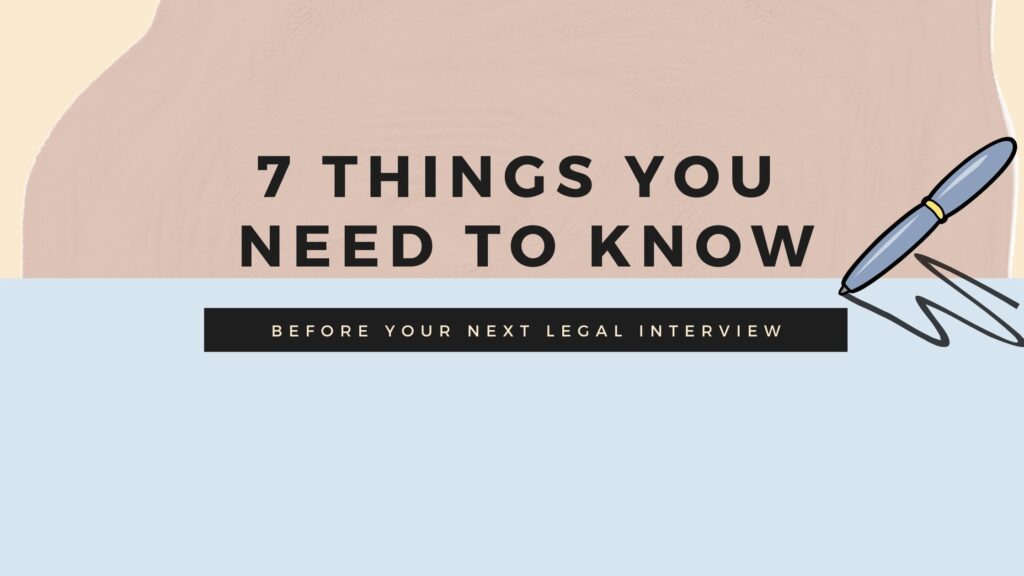Whether you are a first-year law student seeking summer work or a 3L looking to land a post-graduate role, here are seven things to know before your next legal interview.
Know the most Common Questions Before your Next Legal Interview
Legal interviews are tough. Employers are trying to suss out whether you are a good fit for their company and whether you have the chops to get the job done.
They do this by asking targeted questions, many of which I’ve listed in The Ultimate List of Legal Interview Questions.
You can use this list to practice your interview skills and prepare for your next legal interview.
Know how to Predict Interview Questions Before your Next Legal Interview
It’s impossible to predict every question the interviewer will ask, but you can predict some of the questions by doing the following three things:
Guide the Interviewer by Using Specific Descriptors on Your Resume
If you’d like the interview to ask you about a previous experience, include it on your resume with specificity.
For example, if you conducted interesting research while working for an employer, don’t just say “Conducted research.” Instead provide enough detail to interest the reader by saying, “Conducted research on [then list the topic with specificity].
You can use this technique to guide your interviewer since most interviewers ask resume-specific questions. You won’t be asked about every descriptor, but you can bet you will be asked about some.
Think of your resume as an advertisement or piece of marketing material. You have control over its contents, and by virtue of that, you have some control over the interviewer’s questions.
Know your Risks
This is so important that I’ve written an entire section on it below. But, in short, everyone has risks associated with hiring them. Review your resume and corresponding materials with your audience in mind.
Is there anything on there that might stand out as a red flag or a potential risk? If so, be prepared to talk about this during the interview. A keen interviewer will ask about it.
If she doesn’t, you can integrate facts that will assuage her concerns into your answers.
For example, if you don’t have any connection to the region to which you are applying, don’t state “I realize I don’t have a connection here.” Instead, find a way to talk about the reasons you are attracted to the region in your answers to other questions.
Know your resume Inside and Out
Anything on your resume is fair game, so be prepared to talk about it.
Most employers ask resume-specific interview questions. So, to some extent, you can predict your interview questions just by knowing what’s on your resume.

Know your “Risks” Before your Next Legal Interview
No interviewer wants to have egg on her face. So before she recommends the company proceed with a candidate, she is going to thoroughly vet them.
One way interviewers vet candidates is by assessing potential risks and asking corresponding questions to establish whether the risk is a real concern.
Everyone has risks. Everybody.
Risk One: Being too (fill in the blank)
Common risks include being too (fill in the blank with something that doesn’t make sense for your audience). By this, I mean having experiences on your resume that suggest to the employer you are interested in something else.
One example is being too public interest-oriented if you are applying to a large firm. This doesn’t mean that candidates who have a resume full of public interest experience can’t get into Big Law.
But it does mean that you should be prepared to answer questions about your interest in public interest law and be prepared to sell the firm on why you want to work for them.
Another example is being too entrepreneurial. An entrepreneurial spirit is attractive to many types of different legal employers. However, if your resume indicates that your long-term goal is to open your own business, be aware that this could be seen as a risk. And be prepared to discuss it.
Note that these risks typically only matter when you are applying to long-term positions. Most internships and other short-term employers won’t be looking for this type of risk. If you are a 1L, read on to find out your risks, and check out this article.
Risk Two: Having too Much on Your Plate
One risk short-term employers might be looking for, however, is having too much on your plate.
I recently interviewed a student for a semester-long law clerk position. She had a full course load, extracurriculars, and she was doing a clinic.
Can you guess what her risk was?
I was concerned she had too much on her plate and would need to quit the law clerk position before the end of the semester. So I asked her a number of calculated questions to establish whether I should be concerned about this risk.
Other types of Risks
Again, everyone has risks. The types of risks are myriad and can include:
- Not having connections to the geographic region to which you are applying;
- Frequently moving locations (note, this won’t matter if your moves were for things like school or a job that required frequent relocation);
- Frequently switching jobs (this won’t matter for internships; students are expected to get a variety of experiences);
- Having gaps in your resume or taking significant time off;
- Frequently switching industries; or
- Having something on your resume that suggests questionable judgment.
None of these risks are insurmountable. One of the interviewer’s jobs is to assess these risks, and your job is to put the interviewer’s mind at ease when answering questions about them.
Practice your Answers Aloud Before your Next Legal Interview
Some moons ago, I interviewed for my dream job (at the time). It was my previous position running a large On-Campus Interview Program.
I prepared thoroughly. I knew the law school inside and out. I knew the goals of the office. I even spent hours researching industry-specific standards and best practices.
But I didn’t practice my interview answers aloud. “I’m a lawyer,” I thought. “I spend my day distilling really complex subjects into simple terms for my clients.”
I didn’t practice my answers aloud because I am good at talking.
Despite all my preparation. I fumbled through the interview. Miraculously I still landed the position, but my interview could have been so much stronger.
I left dejected and feeling like I’d just talked myself out of a job.
All of this is to say that interviewing puts you in a different mind space. Most of us who are skilled in social situations are good at being humble.
It’s difficult to sell yourself and talk about your accomplishments for an hour. Most students feel like they are bragging and become uncomfortable.
I always say two things in this case:
If you are concerned that you sound like you’re bragging, you’re probably fine.
I’ve sat with hundreds of students who had this concern. Not one of them sounded boastful during a mock interview with me.
This is because they were self-aware enough to know that they were out of their comfort zone and usual manner of speaking.
Practice your answers aloud.
This will help you to gain confidence selling yourself and speaking in this new form. Just like writing–you know when it all sounds good in your head, but you can’t seem to get it on paper?–your answers will sound different coming out of your mouth than they do in your head.
So practice your answers aloud, at least once, before your next legal interview.

Get your Professional Ducks in a Row Before your Next Legal Interview
This step is simple, and it may be something you’ve heard before. Before your start interviewing, lock down your social media and set your voicemail greeting.
Lock Down your Social Media
Yes, employers will Google you. If you have anything on your social media accounts that you wouldn’t want your grandmother seeing, make them private, at least until you’ve solidified a position for the season.
If you don’t want to make them private–which is best practice because lawyers are basically detectives–then consider changing your social media name or hiding certain content.
Once you’ve locked down your social media, you can Google yourself to see if there is anything you might’ve missed.
Set a Professional Voicemail Greeting
Most employers call to schedule interviews. A silly or default voicemail greeting may be viewed as unprofessional by the employer.
Plus, it’s mildly irritating. If I received a default greeting, I’d have to check to ensure I called the right number.
It’s a little step, but it goes a long way in creating a professional persona.
Learn to Take Control of the Interview Before your Next Legal Interview
Have you ever heard someone say, “don’t be afraid to take control of the interview,” and wondered what this means?
I used to wonder too. It doesn’t mean to be aggressive or talk over the interviewer.
It means to be sure you have the opportunity to sell yourself.
The best way to take control of the interview is to set goals. As you prepare, think of five things you want the interviewer to know about you and your experiences.
This can be anything that relates to your professional accomplishments and previous experience. You might want to highlight a project you worked on or tell the interviewer about an academic competition you won.
Once you’ve figured out your five goals, think of ways you can integrate them into your interview answers.
For example, if you won an academic competition, you might choose to highlight that in a question like, “Tell me about yourself” or “How do you like law school?”.
If you are eager to talk about previous projects, you can answer that when the interviewer asks you about your previous experiences at a specific employer.
Once you established your goals, use The Ultimate List of Legal Interview Questions to brainstorm ways to integrate your goals into your answers.
Remember, the Employer Wants to Impress you too
It’s normal to get nervous before an interview and worry about impressing the employer. But, remember, you were offered the interview for a reason.
The employer saw something on your materials, and she wants to impress you too.
Believe it or not, I sometimes get a little nervous before an interview, especially if I am interviewing a candidate that really interests me.
Interviewing is a lot like dating, and both parties are interested in putting their best foot forward.
Once you’ve thoroughly prepared, take a deep breath, and remember that this is also your opportunity to assess whether you want to work for the employer.
It might not feel like it, but you are also interviewing the company.
If you liked, 7 Things you Need to Know Before Your Next Legal Interview . . .
Check out these tips for law school success, and connect with me on Twitter!






